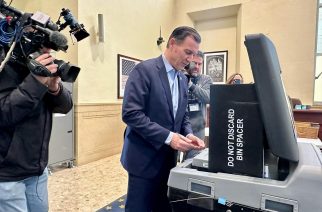
Chair of the Black, Puerto Rican, Hispanic, and Asian Caucus says Bratton’s leaving is “best thing that could have happened” for de Blasio and the city of New York
Two members of the state Assembly say the resignation of New York City Police Commissioner Bill Bratton is a “welcome departure” and a “necessary” step for restoring trust between the police and the community. Bratton announced his resignation Tuesday, even as a new poll among New York City voters indicated he was enjoying his highest approval ratings ever.
Bratton is reportedly accepting a position with Teneo, a global consulting firm, but will stay with the department until mid-September to assist with the transition of a new commissioner. Department Chief James O’Neill will replace Bratton.

Perry
The change in leadership could improve the relationship between the NYPD and minority communities, says the chair of the state Legislature’s Black, Puerto Rican, Hispanic, and Asian Caucus. “NYPD Commissioner Bill Bratton was growing increasingly out of step with what the city needed from its police commissioner,” said Caucus Chair Nick Perry, a Brooklyn assemblyman. “Bratton’s decision to resign is the best thing that could have happened for Mayor Bill de Blasio, and for the city of New York. I welcome his departure, which clears the way for the mayor to appoint a police commissioner who will be more responsive to the need for aggressive reform in policing New York City’s neighborhoods.”
Perry points to an ongoing investigation involving commanders in the department; Bratton’s promotion of Sgt. Kenneth Boss, who was involved in the Amadou Diallo shooting; his handling of the Eric Garner incident; and the recent promotion of Captain Constantin Tsachas, who was recorded demanding minority arrest quotas, as “clear evidence of his disconnect” with members of the black community.
“Mayor de Blasio now has the opportunity to appoint a commissioner who can be more closely aligned with his vision, and what the city needs from our police department,” Perry said. “I do thank Commissioner Bratton for his service to our great city, which included a significant amount of positive contributions, but thank him most for realizing it is time to go.”
Assemblyman Michael Blake, D-Bronx, was recently involved in an incident involving NYPD officers during an arrest in his district. Blake said he was handled roughly by police officers when he tried to step in during an argument between two neighbors. Blake filed a formal complaint against the department and had recently demanded an apology from Bratton, which the commissioner refused.
“With today being National Night Out, it is a perfect time for a change in leadership at the NYPD as it was necessary in order for a new and collaborative direction between the community and officers,” said Blake. “While I am still appalled by the lack of an apology from Commissioner Bratton after the use of excessive force used against me on Saturday, I can and will commend him for his decades of public service and his attempt to keep New Yorkers safe. I commend Mayor de Blasio for taking necessary action to help our communities to heal and move forward together positively with this decisive change.”
Blake said he welcomes incoming Commissioner Jimmy O’Neill, who he describes as a “selfless leader who is ready to lead.” Blake notes that O’Neill was born in East Flatbush, spent more than 30 years serving in the New York Police Department including as a transit officer patrolling the A and D subway lines on the 8 p.m.-to-4 a.m. shift and became a precinct commander of the 4-4 in the East Bronx, which is the precinct that covers his district office. O’Neill is also the architect of the Neighborhood Correction Officer program that aims to help improve community and police relations.
“I look forward to working with Commissioner O’Neill as we collectively rebuild the trust between our communities and the police, use this as a moment for comprehensive reform and improvements for training, interactions, use of force, criminal justice and to build a new bond between law enforcement and the community,” Blake said.
A Quinnipiac University poll released Tuesday showed that 57 percent of registered New York City voters approve of the job Bratton is doing as commissioner, just 1 point lower than his all-time high of 58 percent recorded last October. The poll of 1,310 registered voters also found that 60 percent approve of the way new York City police are doing their job. Sixty-nine percent of residents said they approve of the job police are doing in their own communities. Eighty-four percent of those surveyed described crime as either a “very serious” or “somewhat serious” problem in New York City.
This is Bratton’s second time serving as commissioner of the NYPD. He previously served as commissioner of the Boston Police Department and chief of the Los Angeles Police Department in addition to advising the British government on police matters.









